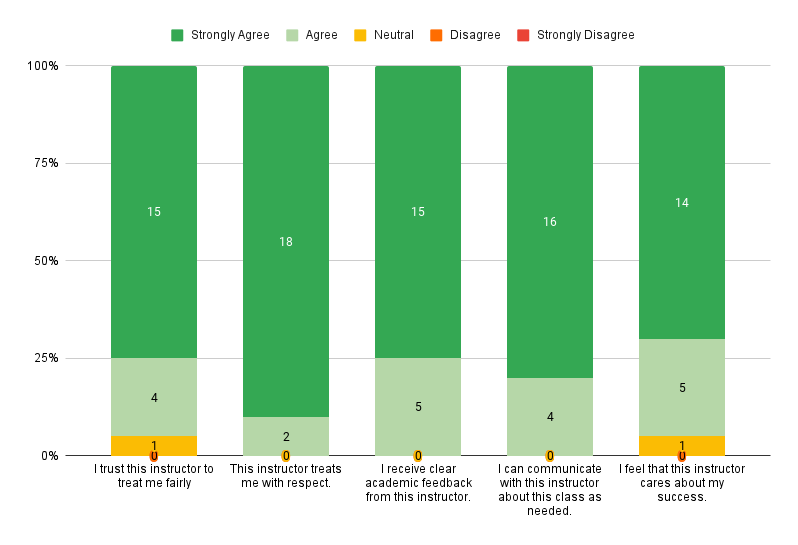Katie Cohen Teaching Portfolio
Teaching Philosophy
There are two overall principles that guide my teaching: 1) My teaching strategies should be informed by the most up-to-date evidence, and 2) My course material should be inclusive and accessible. These two principles similarly guide my program of research; I see my research and teaching as interconnected, each informing and improving the other over time.
The approach I take toward teaching is informed by my work in intervention science. I believe that the core aspects of successful psychoeducational interventions, such as establishing motivation to learn content, practicing the application of knowledge, and adapting content as necessary, are applicable in the classroom.
To help students identify their extrinsic and intrinsic motivations for learning the course material, I use techniques derived from motivational interviewing (Miller & Rollnick, 2013; See example here). This allows students throughout the course to easily remember why they are taking the course and how they may personally benefit from it.
On the first day of class, I discuss “growth mindset” (Dweck, 1990) and the neuroplasticity of the brain in an effort to demonstrate to students that they have the ability to learn and their personal traits are malleable, rather than fixed (See example here). Not only does this encourage students to feel optimistic about their potential to succeed in the class, but it also demonstrates a key skill that the students will learn: applying academic knowledge to personal situations.
To teach students how to apply the knowledge they’ve learned to personal situations, I employ “saying-is-believing” exercises (Higgins & Rholes, 1978) through writing assignments where students are asked to connect a topic discussed in the course with a real-life scenario (See example here). Similar to the goals of psychological intervention, my aim is that by the end of the course, students will not only have gained knowledge but will also be able to use the knowledge they’ve gained to improve their daily lives.
Lastly, I consider course development, similar to the design and dissemination of an intervention, as an iterative, user-centered design process (Lyon et al., 2019). As the course unfolds, I collect students' feedback and adapt the course accordingly (See example here).
I also believe that for students to learn successfully, they must be in an environment in which they are valued and respected. I approach my classes with the core belief that every student is unique, with distinct challenges and circumstances. Rather than treating every student with equality in mind, I treat students with equity in mind. Furthermore, I attempt to anticipate the needs of students. For example, all my lectures with audio components include subtitles. All visual materials shown in class (such as pictures or figures) include alternative text descriptions. At the beginning of every class, students complete a form to indicate their preferred pronouns, preferred name, and name pronunciation. Additionally, because many of the forefront theories in academia were developed by individuals with privileged statuses, I make an effort to address the explicit or implicit biases that may be present in the course materials and the overall literature (See example here).
Courses Taught
Teaching Effectiveness
PSY 310 Feedback, Spring 2023

Comments from students:
"Katie has been extremely helpful throughout the semester. She always takes the time to check-in and make sure that everyone feels comfortable with the content. She's always there to give support and guidance while writing the papers."
PSY 310, Spring 2023
"Thank you for going over how to brainstorm our topics instead of throwing us out there to figure it out"
PSY 310, Spring 2023
"Thank you for making the slides and path to research topic very clear!"
PSY 310, Spring 2023
"I loved that paused and engaged people in conversation every couple of slides. I think this helped make people feel more comfortable to talk about a tough topic."
PSY 620, Spring 2023
"You’re an excellent teacher! Well explained examples and good balance of teaching/ discussion"
PSY 620, Spring 2023
"TAs were absolutely wonderful"
CLIN PSY 426, Fall 2020
"Katie has been a huge help"
CLIN PSY 426, Fall 2020
References
Dweck, C. S. (1990). Self-theories and goals: Their role in motivation, personality, and development. New York: Taylor & Francis
Higgins, E. T., & Rholes, W. S. (1978). “Saying is believing”: Effects of message modification on memory and liking for the person described. Journal of Experimental Social Psychology, 14(4), 363–378. https://doi.org/10.1016/0022-1031(78)90032-X
Lyon, A. R., Munson, S. A., Renn, B. N., Atkins, D. C., Pullmann, M. D., Friedman, E., & Areán, P. A. (2019). Use of Human-Centered Design to improve implementation of evidence-based psychotherapies in low-resource communities: Protocol for studies applying a framework to assess usability. JMIR Research Protocols, 8(10), e14990. https://doi.org/100.2196/14990
Miller, W. R., & Rollnick, S. (2013). Motivational interviewing: Helping people change (3rd ed.). New York: Guilford Press